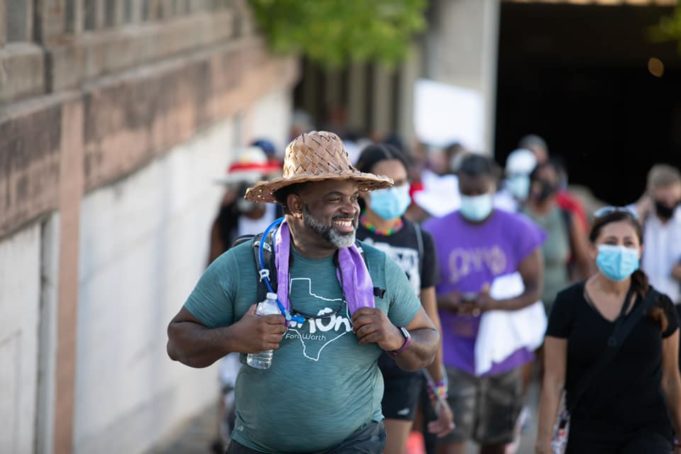After a week-long walk from Fort Worth to Austin, Leon Reed is waiting for the fruits of his arduous journey — a meeting with Gov. Greg Abbott to discuss statewide police reform. The criminal defense attorney and community organizer arrived in the state capital last Tuesday. His feet are blistered and his legs numb, but his spirits are high, he said.
“This is a spiritual endeavor,” he said, referring to the Christian faith that drives his reform efforts. “I have too many police officers and citizens depending on me to get a message to the governor. When I set out, it was to see the governor. I didn’t say I would see him the first day or even the second day after I showed up. I intend to be obedient to what I intended to do.”
As Reed reached Austin, Abbott addressed the media at the Fort Worth police department’s Bob Bolen Public Safety Complex Administration.
“Any city in the state of Texas that defunds law enforcement will have their property tax revenue frozen as of that time,” Abbott said at the Fort Worth press briefing.
The governor’s statements came days after Austin City Council voted to reallocate 34% of city police funds toward social services and reorganizing existing police services. Reed doesn’t see Abbott’s strong stance on protecting police budgets as a setback. The governor has also called for an end to police brutality.
“I’m here to help him do that,” Reed said. “I didn’t come here to pick a fight with the governor. I need the governor. Texas needs the governor. He is the captain of the ship. When you’re the captain, it’s your responsibility to repair that ship. You don’t pass on the same problems to the next captain. I came here to shore him up for the battles he may have.”
Without revealing specific counsel that he has for the governor, Reed said his advice — honed from discussions with police, reform experts, citizens, and academics — falls into three categories: recruitment and training, police operations, and a culture of accountability. Better candidates, training that emphasizes de-escalation, an end to warrior-style mindsets, and greater accountability for problematic officers are all proven steps that can increase public safety and trust in police, Reed said.
“We give police the authority to pull people over,” Reed said. “We need them to treat us in a manner that doesn’t leave us feeling belittled and disrespected. When that happens, we are less likely to submit to their authority in the future.”
Police need help too, he added. Whether that help entails additional time off or access to mental health professionals, the lawyer said he understands that police perform stressful work that requires seeing disturbing crime scenes. Officers who may be in distress need to be given time off to decompress and not called to handle a noise complaint that could result in the unnecessarily rough handling of non-dangerous residents, he said.
Reed said he is working with contacts in Austin to secure an audience with the governor.
“Something needs to change,” Reed said. “If we kick the can on this, then we failed the next generation. We are always going to need police officers. We just want the best and highest quality people we can get.”












